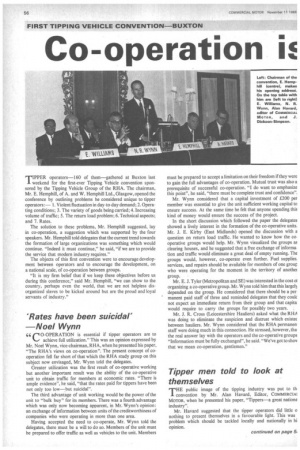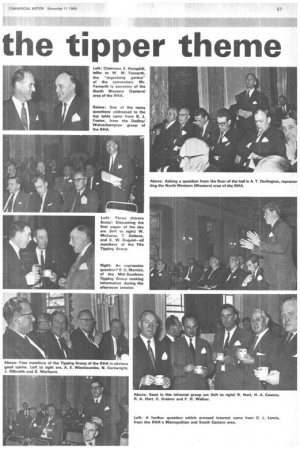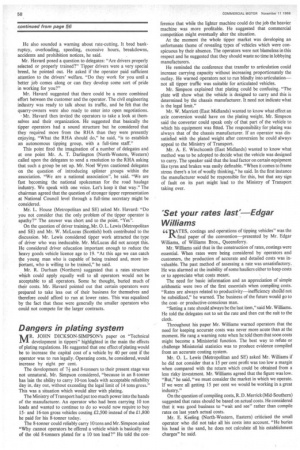Co-operation If
Page 58

Page 59

Page 60

If you've noticed an error in this article please click here to report it so we can fix it.
the tipper theme
TIPPER operators-160 of them—gathered at Buxton last weekend for the first-ever Tipping Vehicle convention sponsored by the Tipping Vehicle Group of the RHA. The chairman, Mr. E. Hemphill, of A. and W. Hemphill Ltd., Glasgow, opened the conference by outlining problems he considered unique to tipper operators:— 1. Violent fluctuation in day-to-day demand; 2. Operating conditions; 3. The variety of goods being carried; 4. Increasing volume of traffic; 5. The return load problem; 6. Technical aspects; and 7. Rates.
The solution to these problems, Mr. Hemphill suggested, lay in co-operation, a suggestion which was supported by the four speakers. Mr. Hemphill told delegates that the current trend towards the formation of large organizations was something which would continue. "Indeed it must continue," he said, "if we are to provide the service that modern industry requires."
The objects of this first convention were to encourage development between operators and to encourage the development, on a national scale, of co-operation between groups.
"It is my firm belief that if we keep these objectives before us during this conference," said Mr. Hemphill, "we can show to the country, perhaps even the world, that we are not helpless disorganized slaves to be kicked around but are the proud and loyal servants of industry."
'Rates have been suicidal' Noel Wynn
44 C 0-OPERATION is essential if tipper operators are to
achieve full utilization." This was an opinion expressed by Mr. Noel Wynn, vice-chairman, RHA, when he presented his paper, "The RHA's views on co-operation". The present concept of cooperation fell far short of that which the RHA study group on this subject now envisaged, Mr. Wynn told the delegates.
Greater utilization was the first result of co-operative working but another important result was the ability of the co-operative unit to obtain traffic for members at economic rates. "There is ample evidence", he said, "that the rates paid for tippers have been not only too low—but suicidal".
The third advantage of unit working would be the power of the unit to "bulk buy" for its members. There was a fourth advantage which was only now becoming apparent, in Mr. Wynn's opinion: an exchange of information between units of the creditworthiness of companies who were operating in more than one area.
Having accepted the need to co-operate, Mr. Wynn told the delegates, there must be a will to do so. Members of the unit must be prepared to offer traffic as well as vehicles to the unit. Members must be prepared to accept a limitation on their freedom if they were to gain the full advantages of co-operation. Mutual trust was also a prerequisite of successful co-operation. "I do want to emphasize this point", he said, "there must be complete trust and confidence".
Mr. Wynn considered that a capital investment of £200 per member was essential to give the unit sufficient working capital to ensure success. At the same time he felt that anyone spending this kind of money would ensure the success of the project.
In the short discussion which followed the paper the delegates showed a lively interest in the formation of the co-operative units. Mr. J. E. Kirby (East Midlands) opened the discussion with a question on return load traffic. He wanted to know how the cooperative groups would help. Mr. Wynn visualized the groups as clearing houses, and he suggested that a free exchange of information and traffic would eliminate a great deal of empty running. The groups would, however, co-operate even further. Fuel supplies. services, and repairs should be available for members of one group who were operating for the moment in the territory of another group.
Mr. E. J. Tyler (Metropolitan and SE) was interested in the cost oi organizing a co-operative group. Mr. Wynn told him that this largely depended on the group. He considered that there should be a permanent paid staff of three and reminded delegates that they coulc not expect an immediate return from their group and that capita would require to carry the groups for possibly two years.
Mr. J. R. Cross (Leicestershire Hauliers) asked what the RHA was doing to eliminate the suspicion and distrust which existec between hauliers. Mr. Wynn considered that the RHA permanen. staff were doing much in this connection. He stressed, however, tha the real answer lay with the operators and the co-operative groups "Information must be fully exchanged", he said. "We've got to shov that we mean co-operation, gentlemen."
Tipper men told to look at themselves
THE public image of the tipping industry was put to th, convention by Mr. Alan Havard, Editor, COMMERCIA1 MOTOR, when he presented his paper, "Tippers—a great nationa industry".
Mr. Havard suggested that the tipper operators did little o nothing to present themselves in a favourable light. This was problem which should be tackled locally and nationally in hi opinion. He also sounded a warning about rate-cutting. It bred bankruptcy, overloading, speeding, excessive hours, breakdowns, accidents and prohibition notices, he said.
Mr. Havard posed a question to delegates: "Are drivers properly selected or properly trained?" Tipper drivers were a very special breed, he pointed out. He asked if the operator paid sufficient attention to the drivers' welfare. "Do they work for you until a better job comes along or can they develop some sort of pride in working for you?"
Mr. Havard suggested that there could be a more combined effort between the customer and the operator. The civil engineering industry was ready to talk about its traffic, and he felt that the quarry-owners were also ready to enter into open negotiations.
Mr. Havard then invited the operators to take a took at themselves and their organization. He suggested that basically the tipper operators had a sound structure but he considered that they required more from the RHA than they were presently enjoying. "What the RHA should do," he said, "is to establish an autonomous tipping group, with a full-time staff."
This point fired the imagination of a number of delegates and at one point Mr. A. T. Darlington (North-Western, Western) called upon the delegates to send a resolution to the RHA asking that such a group be set up. Mr. Noel Wynn cautioned delegates on the question of introducing splinter groups within the association. "We are a national association", he said. "We are fast becoming the national spokesman for the road haulage industry. We speak with one voice. Let's keep it that way." The chairman agreed that the question of stronger tipper representation at National Council level through a full-time secretary might be considered.
Mr. L. House (Metropolitan and SE) asked Mr. Havard: "Do you not consider that the only problem of the tipper operator is apathy?" The answer was short and to the point. "Yes".
On the question of driver training, Mr. 0. L. Lewis (Metropolitan and SE) and Mr. W. McLucas (Scottish) both contributed to the discussion. Mr. Lewis considered tipper work attracted the type of driver who was ineducable. Mr. McLucas did not accept this. He considered driver education important enough to reduce the heavy goods vehicle licence age to 19. "At this age we can catch the young man who is capable of being trained and, more important, who is willing to be trained," he said.
Mr. R. Durham (Northern) suggested that a rates structure which could apply equally well to all operators would not be acceptable to all operators. Some he thought, buried much of their costs. Mr. Havard pointed out that certain operators were prepared to take less out of their business for themselves and therefore could afford to run at lower rates. This was equalized by the fact that these were generally the smaller operators who could not compete for the larger contracts.
Dangers in plating system
mR. JOHN DICKSON-SIMPSON's paper on "Technical development in tipperi" highlighted in the main the effects of plating regulations. He suggested that one effect of plating would be to increase the capital cost of a vehicle by 40 per cent if the operator was to run legally. Operating costs, he considered, would increase by eight per cent.
The development of 7+ and 8-tonners to their present stage was not unnatural, Mr. Simpson considered, "because in an 8-tanner has lain the ability to carry 10-ton loads with acceptable reliability day in, day out, without exceeding the legal limit of 14 tons gross." This was a situation which would alter with plating.
The Ministry of Transport had put too much power into the hands of the manufacturer. An operator who had been carrying 10 ton loads and wanted to continue to do so would now require to buy 15and 16-ton gross vehicles costing £2,500 instead of the £1,800 he paid for his 8-tormer today.
The 8-tonner could reliably carry 10 tons and Mr. Simpson asked "Why cannot operators be offered a vehicle which is basically one of the old 8-tonners plated for a 10 ton load?" He told the con ference that while the lighter machine could do the job the heavier machine was more profitable. He suggested that commercial competition might eventually alter the situation.
At the moment the whole tipper market was developing an unfortunate theme of revealing types of vehicles which were conspicuous by their absence. The operators were not blameless in this respect and he suggested that they should waste no time in lobbying manufacturers. .
He reminded the conference that transfer to articulation could increase carrying capacity without increasing proportionately the outlay. He warned operators not to run blindly into articulation— not all tipper traffic was suitable for articulated vehicles.
Mr. Simpson explained that plating could be confusing. "The plate will show what the vehicle is designed to carry and this is determined by the chassis manufacturer. It need not indicate what is the legal limit."
Mr. W. Marriott (East Midlands) wanted to know what effect an axle conversion would have on the plating weight. Mr. Simpson said the converter could speak only of that part of the vehicle to which his equipment was fitted. The responsibility for plating was always that of the chassis manufacturer. If an operator was dissatisfied with the plated weight after conversion he could always appeal to the Ministry of Transport.
Mr. A. E. Winchcomb (East Midlands) wanted to know what method was to be adopted to decide what the vehicle was designed to carry. The speaker said that the load factor on certain equipment like tyres and brakes was easily definable. "When it comes to frame stress there's a lot of woolly thinking," he said. In the first instance the manufacturer would be responsible for this, but that any sign of fault on its part might lead to the Ministry of Transport taking over.
































































































































